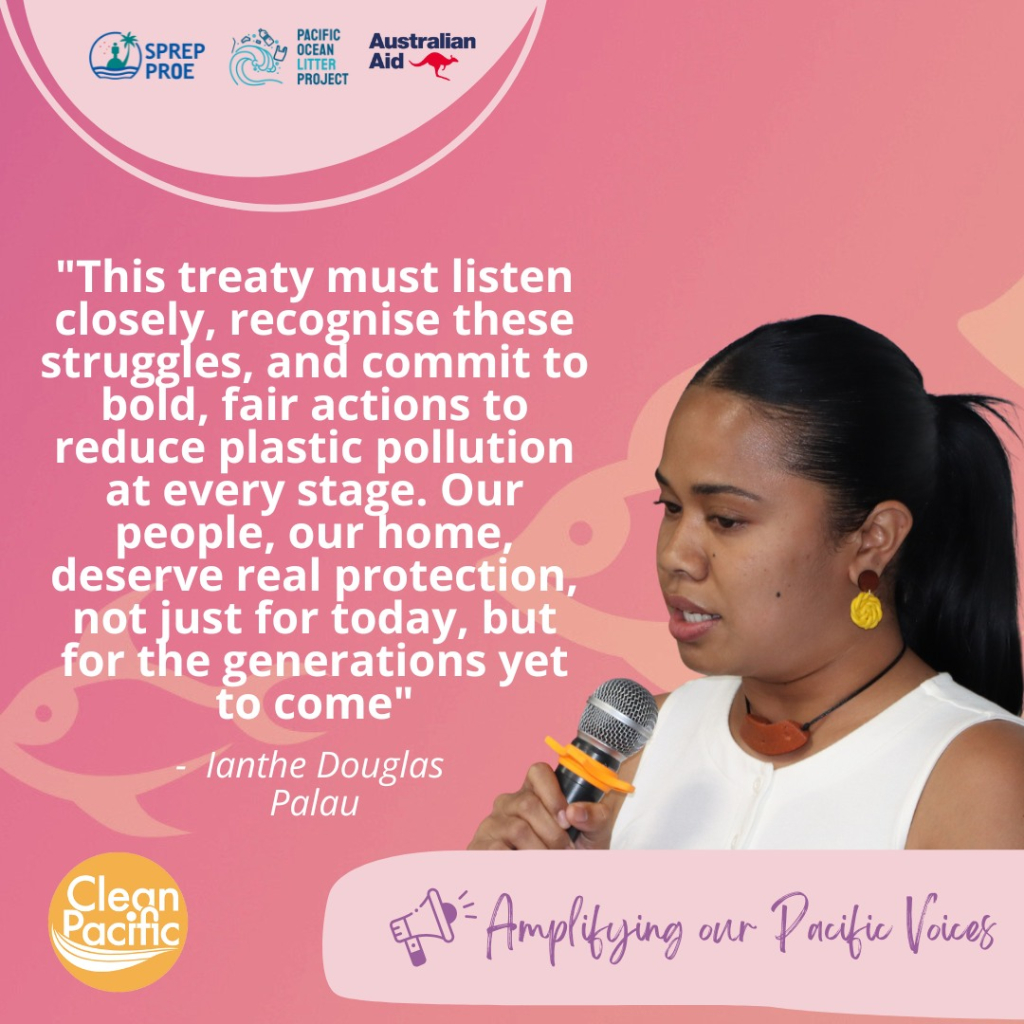
10 July 2025, Apia - Pacific countries have taken a critical step to finalise their priorities as they ramp up the call for a high-ambition treaty that addresses the full life cycle of plastic.
Ahead of the second part of the fifth session of the Intergovernmental Negotiating Committee to develop an international legally binding instrument on plastic pollution, including in the marine environment (INC-5.2) in Geneva, the Secretariat of the Pacific Regional Environment Programme (SPREP) facilitated the INC-5.2 Pacific Regional Preparatory Meeting from 7-9 July at the Pacific Climate Change Centre (PCCC).
Funded by the Government of Australia through the Pacific Ocean Litter Project (POLP), the Government of Tuvalu as Chair of Pacific Small Island Developing States (PSIDS) chaired the meeting.
Speaking at the closing session on Wednesday, Ms. Pepetua Latasi, Permanent Secretary for the Ministry of Home Affairs, Climate Change and Environment, acknowledged the contribution and hard work by all countries during the discussions. And as the world looks to Geneva where they will hope to finalise a treaty, Ms Latasi is under no illusion about the enormity of the task ahead.
“We have a clear mandate from our governments and communities of what we want to achieve at INC5.2 and for the past three days, we have focused on the Chair’s text, working our way through some of what we believe are key articles,” she said.
“We’ve made some progress in some areas but I also know we still have a lot of work to do in the next few weeks. We look forward to continuing working with the PSIDS Leads and the Co-leads, with the support of the PSIDS membership, to better prepare our PSIDS delegations for the INC5.2.”
The upcoming INC round follows five earlier rounds of negotiations in Uruguay, France, Kenya, Canada and South Korea. Pacific countries have consistently called for a high-ambition treaty that addresses the full life cycle of plastic, from production to disposal, as well as a treaty to reflect the special circumstances of SIDS.
The Republic of Palau, as the Chair of the Alliance of Small Island States (AOSIS), actively participated during the preparatory meeting in Samoa. Ms Ianthe Douglas, the First Secretary at the Permanent Mission of the Republic of Palau to the United Nations reminded that we have already gone past the original deadline for this work.
“We want to bring these negotiations to a close in Geneva but not at the cost of a weak or ineffective treaty,” she said. “Throughout this process, we've made countless compromises in the spirit of cooperation and progress. But now, at this critical juncture, we simply cannot afford to make further concessions that undermine the ambition or integrity of the agreement.”
So what will it take for a breakthrough in Geneva?
“What we need, urgently, is for the major producers, the larger economies, to come to the table in good faith. This treaty cannot succeed without their full engagement,” urged Ms Douglas. “They need to listen, they need to act, and they need to recognise that this is not just about managing plastic waste, it's about reducing production, supporting alternatives, and ensuring that future generations aren't left with a crisis we had the chance to fix. We are ready to work, but we need real commitment, not just from a few, but from all.”
Since the start of the INC process, SPREP with funding from the Government of Australia, has provided Pacific countries with coordination and technical support.

SPREP’s Director of Waste Management and Pollution Control (WMPC), Mr Anthony Talouli, thanked the Government of Australia for the support, as well as all Pacific countries for their engagement.
“These negotiations can be very technical, complex and confusing at times but as we look to Geneva, I want to remind us all to think about what matters the most, and why we continue to engage in this process,” said Mr Talouli.
“This work is about the health of our Pacific people who are unfairly placed at the forefront of a crisis they did not cause, this is about the health of our Ocean, and in essence this is about our survival.
“SPREP has a mandate from our members to promote cooperation in the Pacific region and provide assistance in order to protect and improve our environment and to ensure sustainable, this is part of that work.”
The preparatory meeting was attended by Australia, Cook Islands, Federated States of Micronesia, Fiji, Kiribati, Nauru, New Zealand (virtually), Niue, Palau, Papua New Guinea, Samoa, Tonga, Tuvalu and Vanuatu.
Main Photo: IISD/ENB - Kiara Worth